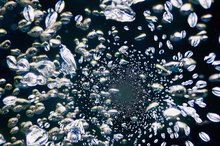The Average Percentage of Water Weight
Water is the most abundant element on the face of the earth. Like the earth, our bodies are mostly composed of water. Without water, we can only survive for a couple of days. In fact, water helps to regulate bodily temperature, dispose of waste, give integrity and fluidity to the blood, and provide cushion to the joints. It also assists in the absorption of vitamins minerals and other nutrients.
Water Weight
If you weigh approximately 160 pounds, your body will contain about 12 gallons of water. That means that of your 160 pounds, 96 are just water. Blood is about 85 percent water, muscle is about 75 percent water, bone is about 20 percent water and fat is about 10 percent water. Also, consider that a water loss of 1 to 2 percent can result in you feeling substantial energy loss and lethargy.
- If you weigh approximately 160 pounds, your body will contain about 12 gallons of water.
Water Loss
How Many Liters of Water Should You Drink?
Learn More
Water is constantly being lost from the body. It is lost through sweating, waste -- urine and feces -- disposal, vapor exchange through breathing and via heat loss. In fact, our bodies must excrete approximately half a liter of water every day just to keep up to the waste production of our metabolic activities. In conjunction, if you are exercising vigorously you can lose up to six cups of water per hour.
- Water is constantly being lost from the body.
- In conjunction, if you are exercising vigorously you can lose up to six cups of water per hour.
Average Percentage
The fact that your body is 60 percent water is approximate. The percentage of water will vary from person to person. The reason for this is that everybody's fat composition is different. This reasoning will be the same when considering that men and younger people's bodies will contain more water than women and older people, because of the fact that women and the elderly generally carry more fat.
- The fact that your body is 60 percent water is approximate.
- This reasoning will be the same when considering that men and younger people's bodies will contain more water than women and older people, because of the fact that women and the elderly generally carry more fat.
Water Percentage
The Effects of Wasting Water
Learn More
The consumption of water does not just revolve around the drinking of water as a fluid. Water is a component of everything we drink and eat. For instance: a watermelon is about 90 percent water, but peanut butter is only about 1 percent; a mushroom is about 90 percent water and a banana is about 75 percent; lettuce is almost 100 percent water and an egg is about 75 percent. However, the best way to replenish the water we lose on a daily basis is to drink fresh water.
- The consumption of water does not just revolve around the drinking of water as a fluid.
Related Articles
References
- Understanding Nutrition; Eleanor Ross Whitney and Sharon Rady Rolfes
- Human Physiology; Lauralee Sherwood
- Nutrition Now; Judith Brown
- Ohashi Y, Sakai K, Hase H, Joki N. Dry weight targeting: The art and science of conventional hemodialysis. Semin Dial. 2018;31(6):551-556. doi:10.1111/sdi.12721
- Beverages, water, tap, drinking. FoodData Central. U.S. Department of Agriculture. Published April 1, 2019.
- Dietary reference intakes for water, potassium, sodium, chloride, and sulfate. National Academies Press, 2005.
- Jéquier E, Constant F. Water as an essential nutrient: The physiological basis of hydration. Eur J Clin Nutr. 2010;64(2):115-23. doi:10.1038/ejcn.2009.111
- Popkin BM, D'Anci KE, Rosenberg IH. Water, hydration, and health. Nutr Rev. 2010;68(8):439-4358. doi:10.1111/j.1753-4887.2010.00304.x
- Adan A. Cognitive performance and dehydration. J Am Coll Nutr. 2012;31(2):71-8. doi:10.1080/07315724.2012.10720011
- Dennis EA, Dengo AL, Comber DL, et al. Water consumption increases weight loss during a hypocaloric diet intervention in middle-aged and older adults. Obesity (Silver Spring). 2010;18(2):300-307. doi:10.1038/oby.2009.235
- National Institutes of Health Genetic and Rare Diseases Information Center. Aquagenic urticaria. Updated June 20, 2016.
- Centers for Disease Control and Prevention. Well testing. Updated April 10, 2009.
Writer Bio
Mike Cottrill has been writing professionally since 1995. He has written for periodicals including "The Cambridge Times" and "Woman's World." Cottrill's first novel, "To Kill By Mourning," was published in 2004. He studied journalism at Conestoga College in Kitchener, Ontario and holds a Bachelor of Arts in sociology and physical education from York University in Toronto.









